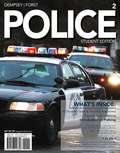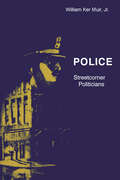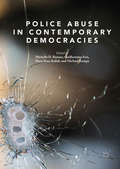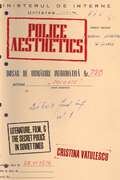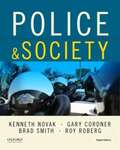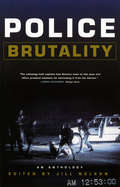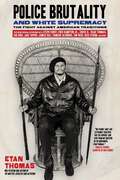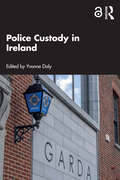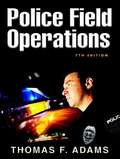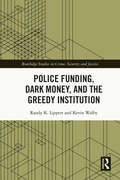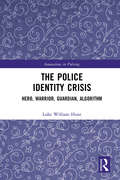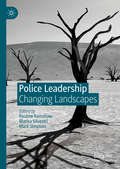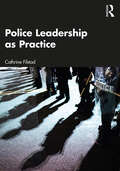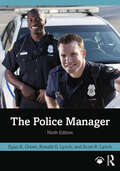- Table View
- List View
Polaroid-Kodak
by Norman A. Berg Glenn W. MerryDescribes Kodak's long-awaited challenge to Polaroid in the field of instant photography. Provides technological and company background of both Polaroid and Eastman-Kodak and their respective product lines. Discusses Polaroid's claim that Kodak infringed on 10 Polaroid patents.
Poles apart on PZU (A)
by Michael Khayyat Vincent Dessain Karol Misztal Francesca GinoIn October 2008, Andrzej Klesyk, CEO of Poland's largest insurer PZU, reflected on possible ways of resolving a decade-long cross-border shareholder conflict at his company. Owned 55% by the Polish State Treasury and 33% by the Dutch insurer Eureko as of October 2008, PZU was a highly profitable company and Poland's biggest asset holder. Eureko aimed at majority ownership of PZU as the building block of its Eastern European expansion strategy. The Treasury, however, was reluctant to forfeit control of the country's crown jewels. Several rounds of negotiations and international arbitration failed to resolve the conflict, leading to a progressive breach of trust. Was there anything Klesyk could do to break this international and multilateral stalemate?
Poles apart on PZU (B)
by Michael Khayyat Vincent Dessain Karol Misztal Francesca GinoIn September 2008, the Polish State Treasury and the Dutch insurer Eureko were wondering if they were ready for reaching an amicable solution on PZU. If so, for how much and under what conditions should they settle so that they, as well as PZU, are satisfied? If not, what other potential alternatives might exist?
Poles apart on PZU (C)
by Michael Khayyat Vincent Dessain Karol Misztal Francesca GinoAfter a decade-long dispute with the Polish State Treasury, in October 2009 the Dutch insurer Eureko agreed to exit PZU in exchange for compensation. Who was the biggest beneficiary of the settlement: Eureko, the Treasury, or PZU itself?
Police
by John S. Dempsey Linda S. ForstCreated by the continuous feedback of a student-tested, faculty-approved process, POLICE, 2nd Edition delivers a visually appealing, succinct print component, tear-out review cards for students and instructors and a consistent online offering with CourseMate that includes an eBook in addition to a set of interactive digital tools, all at a value-based price and proven to increase retention and outcomes. Updated with true-to-life photography, POLICE, 2nd Edition offers a practical perspective of law enforcement, thought-provoking examples and forty years of insight from the authors' firsthand experiences in police work and police education. Better yet, the CourseMate to accompany the 2nd Edition of POLICE is packed with video clips, quizzing, flash cards, games, and other self-test features designed to maximize reader success. The instructor companion website simplifies course and exam preparation. Attention CourseMate user: The CourseMate platform is being sunset and will not be sold with this title after December 31st, 2019. Cengage will support existing users of CourseMate through August 1st, 2020.
Police: Streetcorner Politicians
by William K. Muir Jr."This book . . . examines the problem of police corruption . . . in such a way that the stereotype of the crude, greedy cop who is basically a grown-up delinquent, if not an out-and-out robber, yields to portraits of particular men, often of earnest good will and even more than ordinary compassion, contending with an enormously demanding and challenging job."—Robert Coles, New Yorker "Other social scientists have observed policemen on patrol, or have interviewed them systematically. Professor Muir has brought the two together, and, because of the philosophical depth he brings to his commentaries, he has lifted the sociology of the police on to a new level. He has both observed the men and talked with them at length about their personal lives, their conceptions of society and of the place of criminals within it. His ambition is to define the good policeman and to explain his development, but his achievement is to illuminate the philosophical and occupational maturation of patrol officers in 'Laconia' (a pseudonym) . . . . His discussions of [the policemen's] moral development are threaded through with analytically suggestive formulations that bespeak a wisdom very rarely encountered in reports of sociological research."—Michael Banton, Times Literary Supplement
Police Abuse in Contemporary Democracies
by Michael Kempa Mary Rose Kubal Guillermina Seri Michelle D. BonnerThis volume offers a much-needed analysis of police abuse and its implications for our understanding of democracy. Sometimes referred to as police violence or police repression, police abuse occurs in all democracies. It is not an exception or a stage of democratization. It is, this volume argues, a structural and conceptual dimension of extant democracies. The book draws our attention to how including the study of policing into our analyses strengthens our understanding of democracy, including the persistence of hybrid democracy and the decline of democracy. To this end, the book examines three key dimensions of democracy: citizenship, accountability, and socioeconomic (in)equality. Drawing from political theory, comparative politics, and political economy, the book explores cases from France, the US, India, Argentina, Chile, South Africa, Brazil, and Canada, and reveals how integrating police abuse can contribute to a more robust study of democracy and government in general.
Police Administration: Structures, Processes, and Behaviors (Ninth Edition)
by Charles R. Swanson Leonard Territo Robert W. TaylorThis edition blends a comprehensive introduction to police administration with key supporting details.
Police Administration: Structures, Processes, and Behavior (8th Edition)
by Charles R. Swanson Leonard Territo Robert W. TaylorThis best-selling text presents a vivid introduction to police organizations that focuses on the procedures, politics and human relations issues police supervisors and administrators must understand in order to succeed. Building on the authors' decades of collective experience in law enforcement, training, and teaching, Police Administration 8e is recognized by both the academic and law enforcement communities as the authoritative treatment of this topic. Fully updated in this edition, it includes the latest on the evolution of American policing, the organization and the leader, the management of police organizations, and modern organizational issues.
Police Aesthetics: Literature, Film, and the Secret Police in Soviet Times
by Cristina VatulescuThis volume, at once a history of Soviet cinema and a primer on the historiographical analysis of secret police files, provides an interesting multi-disciplinary discussion of the police in film, police as film makers and the criminal as subject in the darkest corners of the Soviet police state. Arguing that the levels of implicit and explicit control exercised by secret police authorities in Stalin-era Russia created a cultural framework in which art, literature and film, even those not directly affected by the regime, bore the unmistakable mark of their influence. Vatulescu is a professor of comparative literature at New York University. Annotation ©2011 Book News, Inc., Portland, OR (booknews.com)
Police and Society
by Kenneth Novak Gary Cordner Bradley Smith Roy RobergPolice & Society, Eighth Edition, offers an in-depth and analytical look at policing, from police behavior and organization to operations and historical perspectives. Focusing on the relationship between the police and the community and how it has changed throughout the years, the authors explore the most important theoretical foundations and incisive research on contemporary policing and show how that research is put into practice. The text is enhanced by extensive pedagogy and a unique chapter on higher education and policing.
Police Brutality: An Anthology
by Jill NelsonA landmark work by twelve leading critics and community leaders--essential reading for anyone interested in the history of American race relations. Ignited by the infamous shooting of Amadou Diallo, unarmed and innocent, at the hands of New York City police officers, journalist Jill Nelson was moved to assemble this landmark anthology on the topic of police violence and brutality: an indispensable collection of twelve "groundbreaking" (Ebony) essays by a range of contributors--among them academics, historians, social critics, a congressman, and an ex-New York City police detective. This "important and valuable book" (Emerge) places a centuries-old issue in much-needed historical and intellectual context, and underscores the profound influence police brutality has had in shaping the American identity. "[S]hould be read by anyone concerned about ending brutality, and should be required reading in police academies throughout America!"--Charles J. Ogletree, Jr., Harvard Law School "Without hysteria or hyperbole, [Nelson] examines the issue of police abuse in literary form."--Emerge "A memorable and useful contribution to an increasingly volatile national dialogue."--Publishers Weekly "[N]ot only timely, but explores and exposes the sickness of this unbalanced, uncivilized Western pastime thoroughly."--Chuck D of Public Enemy, author of Fight the Power: Rap, Race, and Reality
Police Brutality and White Supremacy: The Fight Against American Traditions
by Etan ThomasAn NBA veteran offers engaging interviews and reflections that explore police brutality, white supremacy, and the struggle for racial justice in America. "Thomas's interviews demand careful reading by all who want to expose racism, hold police accountable, and create an American society that practices social justice." --Library Journal, a Best Book of the Year in Political Science/Civil Rights "The book is filled with thought-provoking interviews and commentary on police brutality, white supremacy, and the lack of racial equality in the United States. Thomas interviewed victims of police brutality and their family members to convey what they actually went through and allow them to share what they experienced directly." —Bullets Forever "My family and I are extremely grateful for the support and love from my brother in the movement, Etan Thomas." --Emerald Garner, daughter of Eric Garner "I'm extremely grateful to Etan for continuing to shine a light on how police violence has harmed families across the nation. Our stories matter." --Dr. Tiffany Crutcher, twin sister of Terence Crutcher ETAN THOMAS, an eleven-year NBA veteran and lifelong advocate for social justice, weaves together his personal experiences with police violence and white supremacy with multiple interviews of family members of victims of police brutality like exonerated Central Park Five survivor Raymond Santana and Rodney King’s daughter Lora Dene King; as well as activist athletes and other public figures such as Steph Curry, Chuck D, Isiah Thomas, Sue Bird, Jake Tapper, Jemele Hill, Stan Van Gundy, Kyle Korver, Mark Cuban, Rick Strom, and many more. Thomas speaks with retired police officers about their efforts to change policing, and white allies about their experiences with privilege and their ability to influence other white people. Thomas also examines the history of racism, white supremacy, and the prevalence of both in the current moment. He looks at the origins of white supremacy in the US, dating back to the country’s inception, and explores how it was interwoven into Christianity--interviewing leading voices both in and outside of the church. Finally, with prominent voices in the media and education, Thomas discusses the continued cultivation of these injustices in American society. Police Brutality and White Supremacy demands accountability and justice for those responsible for and impacted by police violence and terror. It offers practical solutions to work against the promotion of white supremacy in law enforcement, Christianity, early education, and across the public sphere. Featuring original interviews with: Steph Curry, Chuck D, Yamiche Alcindor, Isiah Thomas, Jemele Hill, Craig Hodges, Stan Van Gundy, Mark Cuban, Jake Tapper, Mahmoud Abdul-Rauf, Sue Bird, Kyle Korver, Rick Strom, Cenk Uygur, Tim Wise, Chris Broussard, Breanna Stewart, Rex Chapman, Stephen Jackson, Kori Mccoy, Lora Dene King, Chikesia Clemons, Raymond Santana, Alissa Findley, Amber and Ashley Carr, Michelle and Ashley Monterrosa, Chairman Fred Hampton Jr., Abiodun Oyewole, Marc Lamont Hill, Officer Carlton Berkley, Pastor John K. Jenkins Sr., Officer Joe Ested, Captain Sonia Pruitt, and Bishop Talbert Swan.
Police Chiefs in the UK
by Mark RoycroftThis book examines the changing police landscape over the past 25 years to establish how Police Leadership has evolved to meet this challenge. Through interviews with 35 Chief Police Officers in the UK, the author explores a range of policing issues such as crime investigation, terrorism, police governance, austerity issues, the role of the IPCC and public order provision. The book also highlights views on key topics such as armed policing, globalisation of crime and the structure of forces. Building on the seminal text Chief Constables: Bobbies, Bosses or Bureaucrats by Robert Reiner, which is this year celebrating its 25th anniversary, this book brings research on policing up to date with the modern world. An engaging and well-researched project, this book will be of great interest to scholars of criminal justice, policing and security studies.
Police Custody in Ireland
by Yvonne DalyPolice Custody in Ireland brings together experts from policing studies, law, criminology, and psychology, to critically examine contemporary police custody in Ireland, what we know about it, how it operates, how it is experienced, and how it might be improved.This first-of-its-kind collection focuses exclusively on detention in Garda Síochána stations, critically examining it from human rights and best practice perspectives. It examines the physical environment of custody, police interview techniques, existing protections, rights, and entitlements, and experiences of specific communities in custody, such as children, ethnic minorities, non-English speakers, the Mincéir/Traveller community, and those with intellectual disabilities or Autism Spectrum Disorder. Police Custody in Ireland gives a snapshot of garda custody as it is now and makes important recommendations for necessary future improvements.An accessible and compelling read, this book will be of interest to those engaged in policing and criminology, as well as related areas of interest such as human rights, youth justice and disability studies.The Open Access version of this book, available at http://www.taylorfrancis.com, has been made available under a Creative Commons [Attribution-Non Commercial-No Derivatives (CC-BY-NC-ND)] 4.0 license.
Police Encounters: Security and Surveillance in Gaza under Egyptian Rule
by Ilana FeldmanEgypt came to govern Gaza as a result of a war, a failed effort to maintain Arab Palestine. Throughout the twenty years of its administration (1948-1967), Egyptian policing of Gaza concerned itself not only with crime and politics, but also with control of social and moral order. Through surveillance, interrogation, and a network of local informants, the police extended their reach across the public domain and into private life, seeing Palestinians as both security threats and vulnerable subjects who needed protection. Security practices produced suspicion and safety simultaneously. Police Encounters explores the paradox of Egyptian rule. Drawing on a rich and detailed archive of daily police records, the book describes an extensive security apparatus guided by intersecting concerns about national interest, social propriety, and everyday illegality. In pursuit of security, Egyptian policing established a relatively safe society, but also one that blocked independent political activity. The repressive aspects of the security society that developed in Gaza under Egyptian rule are beyond dispute. But repression does not tell the entire story about its impact on Gaza. Policing also provided opportunities for people to make claims of government, influence their neighbors, and protect their families.
Police Field Operations
by Thomas Francis AdamsThe industry standard for 21st-century policing, "Police Field Operations" is written from the perspective of a working police officer, presenting real-life scenarios an officer is likely to encounter while on-duty. With its focus on community policing, it describes how and why certain procedures are used, and gives informative techniques from leading police academies from around the country. Provides readers with the widest range of up-to-date information. Use-of-force issues - e. g. , when and how much force to use under what circumstances. Provides clearly defined guidelines for shaping and enforcing policy. Officer Survival and Stress Reduction - Exceptionally complete coverage. Helps readers develop the necessary skills of observations, perceptions, interviewing techniques, and crowd and riot control. Great resource material for those involved in police patrol procedures and police and field operations.
Police Funding, Dark Money, and the Greedy Institution (Routledge Studies in Crime, Security and Justice)
by Kevin Walby Randy K. LippertPolice Funding, Dark Money, and the Greedy Institution is about a pervasive but little-studied phenomenon. Private funding of public police entails private entities sending resources to police through unconventional or hidden channels, sometimes for suspect reasons. The book argues police acquisition of this "dark money" befits the notion of a "greedy institution" that pursues resources beyond ample public funding and needs, and seeks ever more loyal members beyond its traditional boundaries to reproduce itself. The book focuses on private police foundations, corporate sponsorships, and paid detail arrangements primarily in North America, how these funding networks operate and are framed for audiences, and the forms and volumes of capital they generate. Based on interviews with police representatives, sponsors, funders, and foundation representatives as well as records from over 100 police departments, this book examines key issues in private funding of public police, including corporatization, accountability, corruption, and the rule of law. It documents and analyzes the troubling explosion of police foundations and sponsors and corporate paid detail brokers unknown to the public as a social and policy issue and a hidden response to the global police defunding movement. The book also considers potential policy responses and community safety alternatives in a more generous society. An accessible and compelling read, students and scholars in criminology, criminal justice, law, sociology, political science, anthropology, geography, as well as policymakers, will find this timely book revealing of a neglected, growing area of police practice spanning multiple themes and jurisdictions.
The Police Identity Crisis: Hero, Warrior, Guardian, Algorithm (Innovations in Policing)
by Luke William HuntThis book provides a comprehensive examination of the police role from within a broader philosophical context. Contending that the police are in the midst of an identity crisis that exacerbates unjustified law enforcement tactics, Luke William Hunt examines various major conceptions of the police—those seeing them as heroes, warriors, and guardians. The book looks at the police role considering the overarching societal goal of justice and seeks to present a synthetic theory that draws upon history, law, society, psychology, and philosophy. Each major conception of the police role is examined in light of how it affects the pursuit of justice, and how it may be contrary to seeking justice holistically and collectively. The book sets forth a conception of the police role that is consistent with the basic values of a constitutional democracy in the liberal tradition. Hunt’s intent is that clarifying the police role will likewise elucidate any constraints upon policing strategies, including algorithmic strategies such as predictive policing. This book is essential reading for thoughtful policing and legal scholars as well as those interested in political philosophy, political theory, psychology, and related areas. Now more than ever, the nature of the police role is a philosophical topic that is relevant not just to police officials and social scientists, but to everyone.
The Police In America: An Introduction
by Charles M. Katz Samuel WalkerThe Police in America provides a comprehensive introduction to the foundations of policing in the United States today. Descriptive and analytical, this text is designed to offer students a balanced and up-to-date overview of who the police are and what they do, the problems they face, and the many reforms and innovations that have taken place in policing.
Police Leadership
by Quinn MccarthyThis volume goes beyond other books on police leadership by exploring the topic from a distinctively police perspective. Based on a leadership model developed specifically for the police leader, the book focuses on behaviour and how that behaviour shapes both the culture and the climate of an organization.
Police Leadership: Changing Landscapes
by Marisa Silvestri Mark Simpson Pauline RamshawThis book draws upon a range of theoretical and empirical research to explore contemporary debates about police leadership. Focusing upon leadership styles, ethics, integrity and professionalism, workforce diversity, legitimacy and accountability, it reviews the changing context and nature of leadership over time and explores the gains, losses, tensions and challenges that different leadership models bring to policing. Leadership is present at various levels within the police service and this collection reflects upon appropriate leadership qualities and requirements for different roles and at different ranks. The book also considers the difference between leadership and management in an attempt to capture fuller debates within police leadership. Part one surmises the contextual backdrop to current thinking and the primary challenges facing leadership in the police service. Part two highlights the changing face of leadership through an exploration of the call for greater diversity within the ranks of police leadership, and the final section examines police leadership beyond England and Wales. Through this, Police Leadership explores how the challenges facing police leadership in England and Wales share similarities with those in Scotland, Northern Ireland, Greece, North America, and Australia in the face of the pressures of political and economic uncertainty.
Police Leadership as Practice
by Cathrine FilstadPolice Leadership as Practice applies a leadership-as-practice approach (emphasising leader-employee relationships) to law enforcement. This book provides a progressive and collaborative leadership text for students of law enforcement, as well as insights into leadership dynamics in all organisations for students and researchers of business and management. The police leadership-as-practice perspective provides a holistic understanding of leadership in the police, identifying factors that inhibit and promote learning. It refers to four main components as dynamic and continuously evolving processes: Strategies: social mission and organisation, along with strategies as practice Community: organisational and police culture, identity and belonging, community of practice and competencies Participation: sense-making and discretion; power and politics Activities: learning as practice, change and change management as practice Practical and enriched with case studies, examples and best practice, the textbook is also rigorously research based. Authored by a professor of business and management with specialist knowledge in police leadership, it brings the cutting edge of leadership thinking to the practicalities of policing. It is essential reading for those engaged with policing, leadership roles, and management.
The Police Manager: 8th Edition
by Egan K. Green Ronald G. Lynch Scott R. LynchThe Police Manager, 8th Edition, is a major update, with a completely fresh chapter on school resource officers, based on a new case study, and a new chapter on managing high-profile events. Every police agency today faces the possibility of controversy, and the need to train managers to deal appropriately with the media and the public continues to increase. Green, building on the foundation laid by Ronald Lynch in prior editions, gives practical, field-tested guidance to students and professionals who aspire to leadership roles in law enforcement, providing a comprehensive explanation of issues and challenges that they will face as police supervisors. The book is divided into four parts, covering historical and philosophical underpinnings, behavioral aspects of police management, functional aspects of police management, and major issues in modern police work. This eighth edition is ideal for police management courses in U.S. undergraduate criminal justice programs, as well as for law enforcement practitioners preparing for promotional examinations. The text is also appropriate for broader criminal justice management courses.
The Police Manager
by Egan K. Green Ronald G. Lynch Scott R. LynchThe Police Manager provides a roadmap for the challenges that police administrators face in their day-to-day duties, including considerations for dealing with subordinate officers and for interacting with the public. Covering a wide range of topics, from fiscal management to use-of-force policies, this text prepares readers for the tasks that police managers are confronted with. Readers benefit by gaining a thorough understanding of the complexities involved in an occupation that creates demands from the public, from public officials, and from other police officers. The book delivers information on these issues, with chapters dedicated to leadership styles and planning for leadership loss, as well civil liability considerations. New material in this edition covers specific challenges for small and underexamined police agencies such as university police departments. The Police Manager is an ideal textbook for college students hoping to work in police administration in the future, and is useful for current police managers who know that their jobs require a constant influx of ideas for overcoming new challenges.

